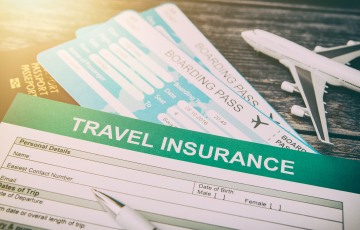How To Compare Travel Insurance?
When preparing for a trip, whether it's a quick getaway or a long expedition, travel insurance can provide peace of mind and crucial financial protection. The process of comparing travel insurance options involves understanding different types of coverage, recognizing your specific needs, and evaluating various insurers.
Travelner Insurance will walk you through the essential steps to effectively compare the market travel insurance, ensuring you find the best fit for your travel needs, including how to compare travel insurance. Here's a breakdown of how to compare travel insurance policies effectively.

Travel insurance offers financial protection and peace of mind during trips.
1. Understanding the Basics of Travel Insurance
Travel insurance serves as a safety net, designed to protect travelers from financial losses stemming from unforeseen events during their trips. Whether it's a canceled flight, a medical emergency, or lost luggage, travel insurance can help cover the costs that may arise. Below, we delve into what travel insurance typically covers, its importance, and the various types of coverage available.
1.1. Why Is Travel Insurance Essential?
Traveling exposes you to certain risks, from minor inconveniences to serious emergencies. Travel insurance is designed to safeguard your travel investment against unforeseen travel-related incidents and financial losses. Here are several reasons why obtaining travel insurance is crucial:
a. Financial Protection:
Travel insurance offers invaluable financial protection by reimbursing you for pre-paid, non-refundable travel expenses in case unforeseen circumstances force you to cancel your trip.
Whether it's due to sudden illness, a family emergency, or any other covered reason, having travel insurance ensures that you can recoup your costs and avoid financial losses that might otherwise disrupt your plans.
From airline tickets to hotel reservations and tour packages, knowing that you have this safety net in place provides peace of mind and allows you to make bookings with confidence, knowing that you're protected against unforeseen cancellations.
b. Peace of Mind:
Travel insurance offers invaluable financial protection by reimbursing you for pre-paid, non-refundable travel expenses in case unforeseen circumstances force you to cancel your trip.
A family emergency, an unexpected sickness, or any other covered cause—having travel insurance guarantees that you may recover your expenses and prevents monetary losses that could otherwise cause your plans to be derailed.
c. Health and Safety:
One of the most critical aspects of travel insurance is its provision for health and safety. Traveling to foreign countries can sometimes entail risks, including the possibility of falling ill or encountering medical emergencies.
With travel medical coverage, you gain access to quality healthcare services wherever you are, without the burden of hefty out-of-pocket expenses.
1.2. Types of Travel Insurance Coverage:
Understanding the different types of travel insurance coverage helps you select a policy that best matches your needs. Here’s a breakdown of the key coverages:
a. Trip Cancellation/Interruption Insurance:
This coverage reimburses you for non-refundable travel expenses if you must cancel or interrupt your trip for a covered reason, such as illness, death of a family member, or severe weather conditions. It ensures that you are not left financially disadvantaged by circumstances beyond your control.
b. Medical Emergency Coverage:
Perhaps the most critical, this coverage pays for the cost of treatment associated with a medical emergency while traveling. This can include hospital stays, surgery, and doctor visits. Some policies also cover medical evacuation, which can be prohibitively expensive without insurance.
c. Baggage and Personal Items Coverage:
This insurance helps replace the contents of your luggage if it’s lost, stolen, or damaged during your trip. Coverage limits vary by policy, so it’s important to ensure the limit is sufficient to cover the value of your belongings.
d. Accidental Death and Dismemberment Insurance:
This coverage pays a lump sum to you or your beneficiary if you are seriously injured or killed while traveling. It’s a type of financial protection that offers added security for unforeseeable tragedies.

Accidental Death and Dismemberment provides financial protection in case of serious injury or death while traveling.
2. Understanding the Need for Comparison
In the vast landscape of travel insurance, where myriad options abound, the necessity of comparison cannot be overstated.
With a multitude of policies offering varying levels of coverage and benefits, taking the time to thoroughly compare the market holiday insurance and evaluate each option is crucial in ensuring you secure the most suitable protection for your specific travel needs.
2.1. Why Compare Travel Insurance Plans?
Comparing travel insurance plans allows travelers to find the most suitable coverage for their needs at the best possible price. Each insurance plan may offer different levels of coverage, benefits, and premiums, so comparing them ensures that you get the most value for your money.
2.2. Benefits of Comparing Travel Insurance:
a. Cost Savings:
By comparing various insurance plans, you can find one that offers adequate coverage at a competitive price.
b. Tailored Coverage:
Comparing allows you to customize your coverage based on your specific travel needs and preferences.
c. Better Understanding:
Comparing policies helps you understand the fine print, exclusions, and limitations of each plan, ensuring you know what you're getting.
3. Factors to Consider When Comparing Travel Insurance
Travel insurance serves as a crucial safety net for globetrotters, offering a shield against the unexpected while exploring the world. However, selecting the right travel insurance plan involves more than just a cursory glance at the premiums.
Understanding the intricacies of coverage options, premiums, deductibles, exclusions, and limitations is paramount to ensure comprehensive protection tailored to individual needs.
3.1. Coverage Options:
Different travel insurance plans offer varying levels of coverage. Therefore, you should consider what type of coverage you need based on your travel destination, activities planned, and personal preferences. Common coverage options include:
- Medical Coverage: Covers medical expenses incurred due to illness or injury while traveling.
- Trip Cancellation/Interruption: Provides reimbursement for prepaid, non-refundable trip expenses if your trip is canceled or interrupted for covered reasons.
- Baggage Loss/Delay: Offers compensation for lost, stolen, or delayed baggage during your trip.
- Emergency Medical Evacuation: Covers the cost of emergency medical transportation to the nearest suitable medical facility.
- Travel Assistance Services: Provides 24/7 assistance for emergencies such as medical referrals, legal assistance, and travel arrangements.
3.2. Premiums and Deductibles:
Compare the premiums and deductibles of different insurance plans to find one that fits your budget and keep in mind that a lower premium may come with higher deductibles, and vice versa.
Moreover, you should consider your financial capabilities and risk tolerance when choosing the right balance between premiums and deductibles.
3.3. Exclusions and Limitations:
Carefully review the exclusions and limitations of each insurance plan to understand what is not covered. Common exclusions may include pre-existing medical conditions, adventure sports, high-risk activities, and acts of war or terrorism.
Therefore, make sure you are aware of any restrictions that may apply to your specific circumstances.

Review insurance plans' exclusions and limitations to understand what's not covered, such as pre-existing medical conditions, high-risk activities and more.
4. How to Compare Travel Insurance?
Navigating through the multitude of travel insurance plans might initially feel overwhelming, yet by employing a strategic approach, discovering the optimal coverage tailored to your requirements becomes an achievable feat.
Delving into the nuances of various policies empowers you to make informed decisions, ensuring that you secure the protection best suited to your specific travel scenarios.
4.1. Research and Gather Information:
Start by researching different travel insurance providers and their offerings. Moreover, you can visit Travelner Insurance website to gather information on the types of coverage available, policy details, exclusions, and premiums.
4.2. Utilize Comparison Tools on Travelner Insurance:
When comparing travel insurance plans, utilizing comparison tools can simplify the process and help you find the best coverage for your needs. Travelner Insurance offers a user-friendly comparison tool on their website, allowing you to compare multiple insurance plans side by side. Here's how to utilize the comparison tool effectively:
Visit the Travelner Insurance Website:
- Step 1: Enter Your Trip Details;
- Step 2: Select Coverage Options;
- Step 3: Generate Quotes;
- Step 4: Review Coverage Details;
- Step 5: Select the Best Plan.
4.3. Analyze Quotes and Coverage:
Once you've gathered quotes and compared coverage options, carefully analyze the details to make an informed decision, such as:
- Compare the premiums, deductibles, coverage limits, and any additional benefits or optional add-ons offered by each plan.
- Consider factors such as the level of coverage provided, the cost of the policy, and any discounts or promotions available.
4.4. Read Policy Details Carefully:
Before purchasing a travel insurance plan, carefully read the policy details, terms, and conditions.
You should pay attention to coverage limits, exclusions, cancellation policies, and any additional benefits or optional add-ons. Look for any specific terms or conditions that may affect your coverage, such as age limits, pre-existing medical conditions, or trip duration restrictions.
4.5. Consider Individual Needs and Preferences:
Consider your unique travel needs, destination, activities planned, and medical history when comparing insurance plans. Choose a plan that provides adequate coverage for your specific circumstances and preferences.
5. Can I Consult with An Expert for Guidance in Choosing the Right Travel Insurance Plan?
Of course, you absolutely can consult with an expert to ensure you select the most suitable travel insurance plan for your needs. When it comes to safeguarding your travel adventures, having the right insurance coverage is paramount for peace of mind and security. That's where Travelner Insurance steps in to assist you in navigating the complexities of travel insurance options.
Travelner Insurance offers a dedicated team of knowledgeable experts who are readily available to provide personalized guidance tailored to your specific requirements. Whether you're embarking on a solo backpacking journey across continents, planning a family vacation, or organizing a corporate trip, our experts are equipped with the expertise to help you make informed decisions.

Travelner Insurance offers expert guidance to help you choose the right travel insurance plan for your needs.
Conclusion
By comparing travel insurance plans, you can find the best coverage at competitive prices, tailored to your specific travel requirements. Factors to consider include coverage options, premiums, deductibles, exclusions, and limitations.
Let’s utilize tools like Travelner Insurance's comparison tool that can streamline the process and help you make informed decisions.
>>> Read more: How does travel insurance car accident work?
Explore tailored travel insurance and protect your trip now!
Related articles

Jun 25, 2024
Compare Annual Travel Insurance Plans: Find the Perfect Protection for Your Frequent Travels

Jun 19, 2024
Unpacking IMG Travel Insurance Reviews: Is It the Right Choice for Your Travel Needs?

Jun 18, 2024
Compare Travel Insurance Packages: A Comprehensive Guide

Jun 18, 2024







